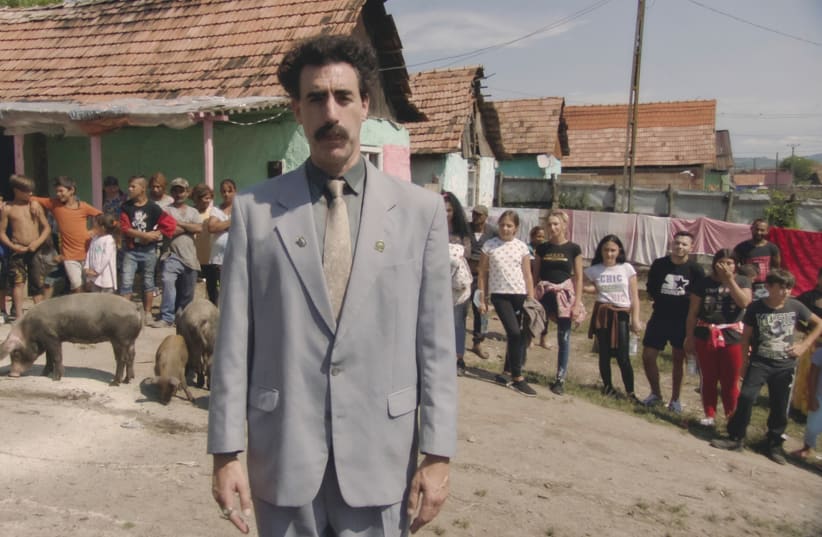When Sacha Baron Cohen burst onto the movie and pop culture scene in 2006 with Borat: Cultural Learnings of America for Make Benefit Glorious Nation of Kazakhstan, where he introduced the bumbler from Kazakhstan who headed to the US and pranked clueless Americans, he was a lone figure of anarchy and craziness set against a landscape of American civility.
Now, in the age of neo-Nazi rallies in the US and a global pandemic, outrageous Borat fits right in as he embarks on a second American walkabout in Borat Subsequent Moviefilm, which became available on October 23 on Amazon Prime Video.
While his successful pranking of President Donald Trump’s lawyer, Rudy Giuliani, has gotten the most attention, there is much funnier stuff here, as Baron Cohen turns it up a notch to make sure he’s still the most ridiculous guy in the room.
And Baron Cohen, who has become the streaming era’s biggest star, with his turns as Israeli super spy Eli Cohen and American radical Abbie Hoffman in the Netflix movies, The Spy and The Trial of the Chicago 7, shows that Jewish humor — albeit screamingly offensive and gallows Jewish humor — is still at the core of all he does.
The biggest, most innovative joke from the first film continues into this sequel — that although everyone else from Kazakhstan speaks what sounds like an Eastern European language, Borat always speaks Hebrew, and pretty good, slangy Hebrew, when he is supposedly speaking Kazakh. Most international audiences won’t get this, of course, but in Israel, it adds another layer to the laughs.
In this era when antisemitism has surged throughout the US and the world, Baron Cohen gets laughs — or offends you deeply, depending on your point of view — with Holocaust denial and antisemitism jokes. When he buys a cake to bring to Vice President Mike Pence and the helpful bakery worker in Texas asks what she should write on it, he says, “Jews will not replace us,” a chant that torch-bearing demonstrators shouted at the infamous 2017 rally in Charlottesville, Virginia. “Anything else?” she asks, as she writes the words in blue icing. “Maybe some smiley faces,” he says.
A thread through the entire movie is that Borat and his teenage daughter (Maria Bakalova) are suddenly brought into the 21 century when they arrive back in the US and encounter the Internet, which teaches them about Holocaust denial. This sends Borat into despair, since he takes a deep sense of national pride in Kazakhstan’s role in perpetrating the Holocaust. “Our nation’s proudest moment, the Holocaust, never happened,” he says at one point, downcast.
A scene that has been the source of controversy is an exchange Borat has with a Holocaust survivor, Judith Dim Evans, at a synagogue. Borat goes in, saying “since I did not have money to buy a gun, I went to the nearest synagogue to wait for the next mass shooting, disguised as a typical Jew.” This disguise consists of a Pinocchio-type nose, a bag of money and a marionette labeled “Media.” There, he meets two women and talks to Evans at length, who tells him that she witnessed the Holocaust and offers him a hug.
In response to her passionate statements about the Holocaust, Borat responds, “It really happened, thank you, you made me so happy.”
Evans passed away recently and, although the film is dedicated to her, her family is suing Baron Cohen and Amazon, saying she thought she was participating in a documentary, not a “mockumentary.”
At another point, he is taken in by two QAnon supporters. Asking them whether Hillary Clinton drinks children’s blood — a clear, antisemitic trope — they say, “that’s what we’ve heard.”At a Trump rally, Borat goes onstage dressed as a country singer and gets the crowd to chant along with him as he sings, “Journalists, what ya gonna do?/Chop them up like the Saudis do!” and “Scientists, what ya gonna do?/Gas ‘em up like the Germans do!”
At times it’s hard to believe that the people on screen weren’t in on the joke — although Guiliani certainly seems to accept Borat’s daughter as an Eastern-European journalist —even if they had an inkling of what was going on, it’s hard not to cheer as Borat lampoons antisemitic conspiracy theories.
The fact that the world has become as twisted as Borat is something that no one could have foreseen in 2006, but Baron Cohen has found a way to make fun of the New Normal — and that’s no small feat.
